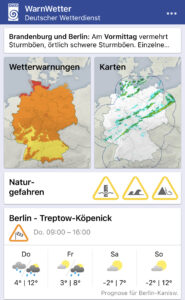In its ruling of 12 March 2020, the German Federal Court of Justice decided that the Deutscher Wetterdienst (Germanys National Meteorological Service) may offer its WarnWetter-App free of charge and without advertising only for weather warnings (file number: I ZR 126/18). We would like to briefly highlight some of the effects that this ruling may have on the weather market, both from the user’s and the provider’s point of view.

Background
The Deutscher Wetterdienst has been offering the WarnWetter app since 2015. As the name suggests, the main focus is on disseminating warnings of dangerous weather phenomena. However, the app also contains other information that informs the user about general weather developments. WetterOnline and wetter.com, as private providers of weather apps, have taken legal action against this. Following various rulings by the lower courts, the Federal Court of Justice has now announced its decision today.
This is the first time so far that the Federal Court of Justice has had to deal with a question of the competitive relationship between private and public weather services. Nor are we aware of any cases from other countries in which a Supreme Court has ruled on this issue.
Impacts on users of the WarnWetter-App
The Deutsche Wetterdienst has already changed the WarnWetter app after a corresponding ruling from the lower court in such a way that general weather information can be activated against a payment of 1.99 Euro. In this respect, nothing changes for the app users, the status quo remains the same.
Implications for private and public weather services in Germany
Beyond the pure factual content of the judgement, the fact that the Federal Court of Justice classified the weather information offered in the app as a business act of the Deutscher Wetterdienst is significant. This can certainly not only be applied to the information in the app, but also has an impact on activities of the Deutscher Wetterdienst in other areas where it competes with private providers.
The question of how the evaluation of the 2017 amendment to the Gesetz über den Deutschen Wetterdienst (German Weather Service Act) will deal with the ruling will certainly also be interesting. The amendment provided for an evaluation of the innovations, which is currently being carried out by the Federal Ministry of Transport and Digital Infrastructure.
The ruling does not affect open-data regulations that were introduced with the amendment of the Gesetz über den Deutschen Wetterdienst in 2017. However, there are also discussions here about the distinction between free (raw) data and services subject to charges or data sets specially created for certain customer groups.
Irrespective of this, all private weather services are well advised to make their services so attractive that they achieve a high level of customer benefit and survive in the market – regardless of any free offers from government agencies. There are plenty of opportunities for this, and users of weather information also benefit from the diversity on the market.
With the clarification by the Federal Court of Justice, there is in any case an opportunity for a clearer division of tasks between public and private weather services in Germany. Cooperation in a spirit of partnership has many economic advantages. This is also supported by a World Bank report published earlier this year and the activities of the World Meteorological Organization on public-private engagement.
Implications for private and public weather services in Europe
The Federal Court of Justice based its ruling only on specific German legal provisions. In this respect, there is no direct impact on weather services in other European countries. Indirectly, the judgement will certainly be read carefully and compared with the legal situation in your own country.
Irrespective of this, the judgement should also further fuel the debate in Europe as to which public services are provided free of charge and which services are of a commercial nature. Private and state weather services are well advised to respect the principle of partnership. Together and in good collaboration, much more can be achieved both for the protection of the population and for the provision of meteorological expertise for the media and the economy than in a dispute against each other.
